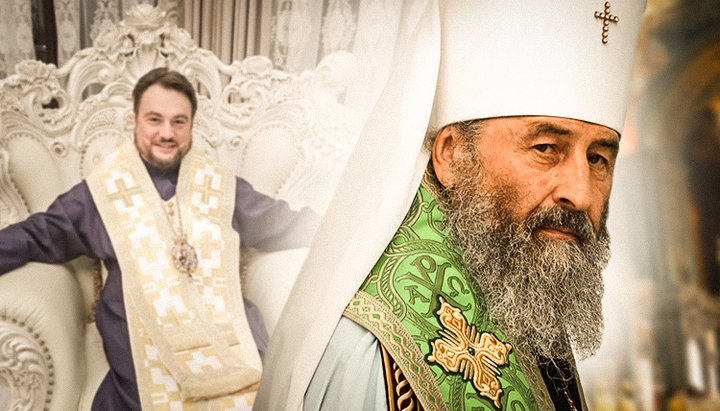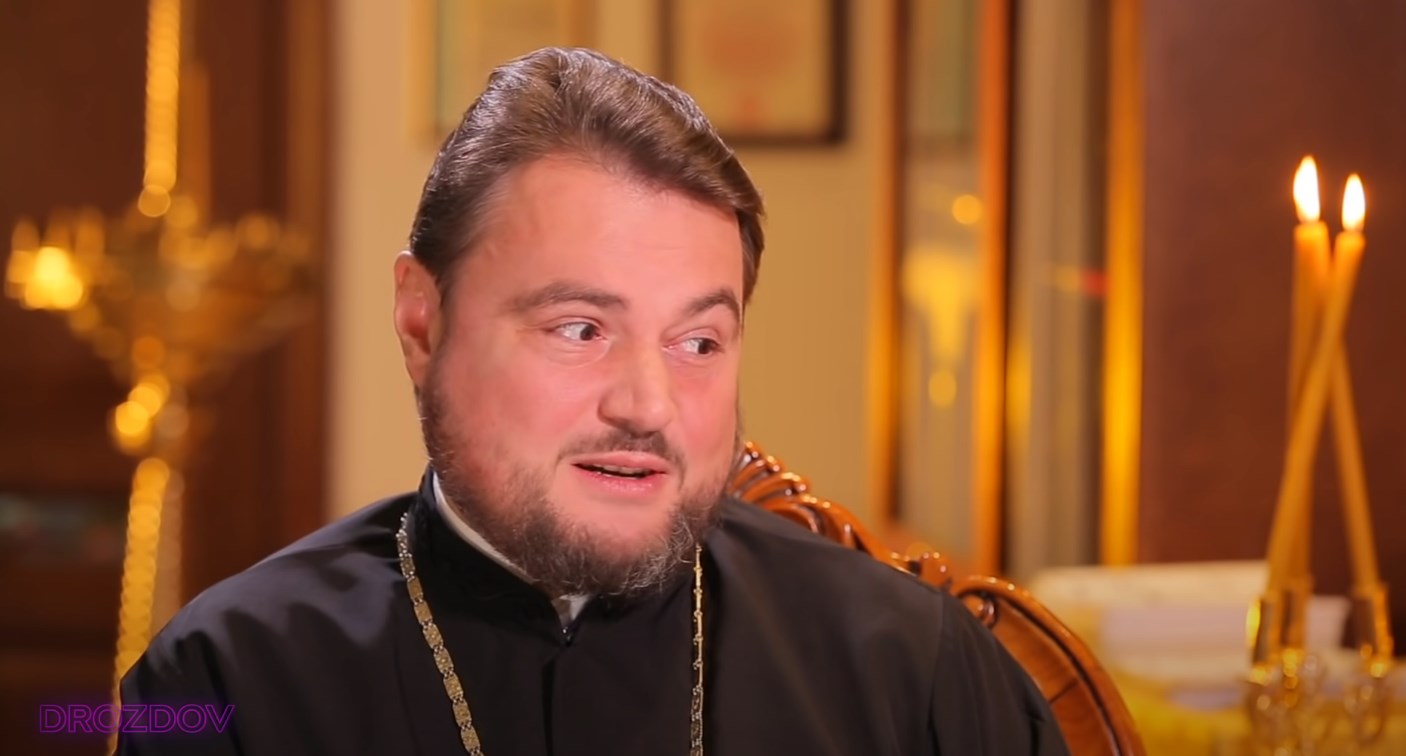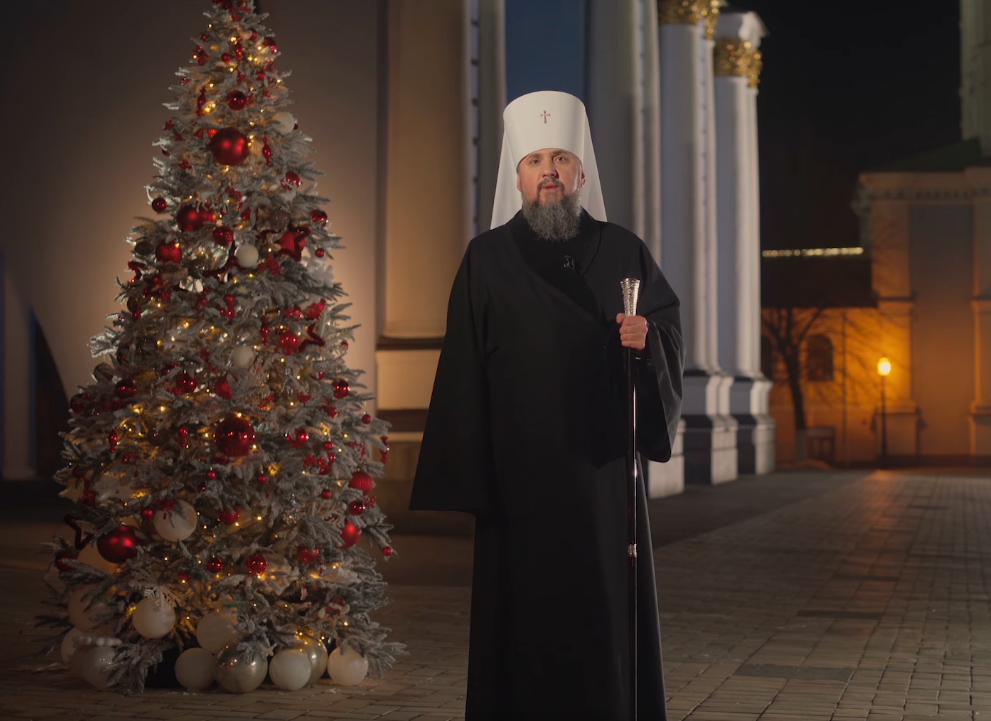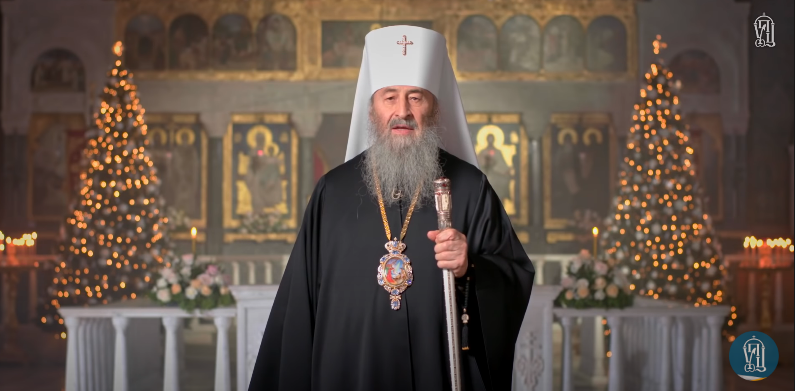Drabinko’s manifesto: what UOC and OCU actually are

"Hierarch" of OCU Alexander (Drabinko) ironically called the UOC Primate a citizen of Heaven and the one who sees everything through the Gospel prism. But is it bad?
On January 6, 2021, former UOC Metropolitan Alexander (Drabinko) gave an interview to Ostap Drozdov, the main topic of which was "Enemies from the Moscow Patriarchate". The former metropolitan did not object to such setting of the question, although as a man with a theological education (a diploma, at least) he should have known perfectly well who is called an enemy in the church doctrine – "For our struggle is not against flesh and blood, but against the rulers, against the authorities, against the powers of this dark world and against the spiritual forces of evil in the heavenly realms." (Eph 6:12). But this is not the main point in the interview. Without even knowing it, Drabinko issued a whole manifesto about what the UOC and the Orthodox Church of Ukraine really are. Now that he did open his mouth, take a look at what came out of it.

Ostap Drozdov, to whom the "hierarch" of the OCU agreed to give an interview, is a longtime and very aggressive critic of the UOC, the one who does it "on the edge of breaking point" and in many cases –beyond the edge. Even the very titles of his previous broadcasts, such as "Get the Moscow Patriarchate out", speak for themselves. His main task is to use fakes and manipulations to inflame hostility and hatred against the Church. Therefore just the fact of Drabinko meeting with such a journalist per se is very revealing.
Despite the fact that the interview was held before Christmas, the discussion was not about Christ, His coming to the world, and not even about the OCU, which was mentioned in passing. It was about the UOC and pursued the only goal – to put it in as negative a light as possible, which both Drozdov and Drabinko are really professional at. And it was a negative pitch that former Metropolitan Alexander spoke about the Primate of the UOC, His Beatitude Metropolitan Onuphry. Yet, here's an interesting thing: trying to sling mud at His Beatitude, Drabinko achieved just the opposite result. How did this happen? Let us analyze.
Here are Drabinko's words: "Educated at the Trinity-Sergius Lavra, Metropolitan Onuphry himself came from Bukovina. Bukovina joined Soviet Ukraine after Romania was a party to the war with the Soviet Union. It should not be forgotten that these people have no special Ukrainian roots. After the war he entered Trinity-Sergius Seminary, then Academy. St. Sergius Lavra implies that the upbringing ... I wouldn't say it could be pro-Ukrainian. It's a man of the globe, I would say. He sees everything through the prism of scripture, maybe the lack of national consciousness. He has a passport, but he doesn't need one: ‘We are citizens of Heaven’. I'm saying this in the context of getting it clear who is leading us. We won't have an idea of how it is led until we have an idea of whom it is led by."
We’d better not focus our attention on how easily Alexander (Drabinko) characterized inhabitants of Bukovina as some "inferior Ukrainians", people without "Ukrainian roots". Let us also not dwell too much on the Freudian slip that Drabinko made when he said that Metropolitan Onuphry "leads us".
We’d better pay attention to the portrait of His Beatitude Onuphry.
First, Metropolitan Onuphry sees everything "through the prism of Holy Scripture”. Second, he has no national consciousness. And third, he is a "citizen of heaven". In this connection the question immediately arises – isn't all this a sign of a true shepherd of Christ's flock? Isn't what a bishop of the Church of God and every genuine Christian in general should be?
Interestingly, under this news item on the UOJ website, readers took Drabinko's words in exactly this vein. One of the commentators wrote, "The argument of a godless man! Without even knowing it, he gave an excellent characterization of Metropolitan Onuphry.”

Commenter Alexander writes, "All the other statements cited are rubbish, but the words 'Not pro-Ukrainian’.... ‘Only Holy Scripture’... ‘We are citizens of heaven’ – this is on the contrary good and necessary!!!!" And the commenter with the nickname "mistermatros" sums it up, "Thank God we have such a Primate! Thank God!"

It is difficult to disagree with these comments. After all, Holy Scripture, which for some reason gives Alexander (Drabinko) cause for irony, states absolutely unambiguously: Christians are citizens of Heaven.
Our Lord Jesus Christ, in answer to Pontius Pilate's question as to whether He was a king, answered, "My kingdom is not of this world..." (Jn 18:36). Like Christ, the holy apostles call Christians to strive for heaven, to the point of forgetting their earthly fatherland. "But our citizenship is in heaven, and we eagerly await a Savior from there, the Lord Jesus Christ..." (Phil 3:20); "For here we do not have an enduring city, but we are looking for the city that is to come" (Heb 13:14), and so on. The troparions of many of the saints refer to them as earthly angels and heavenly men. For example, the troparion to St. Sisy the Great, "You have mortified the passions of the flesh through temperance, you crucified yourself for the world, and in the wilderness you are an angel of the earth and a man of heaven, having cut off all lusts...".
Ukraine or Heavenly Jerusalem: Which citizenship is more important for a Christian?
I would like to dwell on one of the Gospel passages in more detail. Chapter 8 of the Gospel of John, where the Lord's conversation with the Jews and the Pharisees, who were very concerned with the "national idea", i.e. the victory over the Romans and the restoration of an earthly Jewish state, reads, "Then Jesus said to the Jews who believed in Him: ’If you hold to my teaching, you are really my disciples. Then you will know the truth, and the truth will set you free’. They answered him, "We are Abraham's descendants and have never been slaves of anyone. How can you say that we shall be set free'? Jesus answered them, ‘Very truly I tell you, everyone who sins is a slave to sin’" (John 8:31-34).
As we see, the sign of a true disciple of Christ is that he abides in the word of God or, as Drabinko put it, sees everything through the prism of Scripture. And he who does not abide in the word of God, accordingly, commits sin and becomes a slave to sin. But next the Lord speaks to the Jews with even harsher words. Notice that the holy Apostle John speaks of these men as "believers", i.e. they believed in Christ but were not able to place His words above their "national conscience”. The fact they were guided by their national consciousness is indicated by their words: we are the seed, descendants of Abraham. And so the Lord says to them the following: "Why is my language not clear to you? Because you are unable to hear what I say. You belong to your fathere, the devil, and you want to carry out your father’s desires. He was a murderer from the beginning, not holding to the truth, for there is no truth in him. When he lies, he speaks his native language, for he is a liar and the father of lies" (John 8:43-44). In other words, the fact that people do not hear the word of God, being unwilling and unable, makes them ultimately children of the devil.
Therefore, former Metropolitan of the UOC Alexander (Drabinko), unwittingly, gave His Beatitude Onuphry a precise and vivid assessment as a true disciple of Christ, abiding in the word of God and having heavenly citizenship. Again, according to Drabinko, this characterization applies to the entire Ukrainian Orthodox Church.
Therefore, the former metropolitan of UOC Alexander (Drabinko), unwittingly, gave His Beatitude Onuphry a precise and vivid assessment as a true disciple of Christ, abiding in the word of God and having heavenly citizenship. Again, according to Drabinko, this characterization applies to the entire Ukrainian Orthodox Church.
It is very unfortunate that the characterization by the former metropolitan of the current chief of the OCU, Sergei (Epifaniy) Dumenko, was very scanty. Question from Ostap Drozdov: "Regarding Metropolitan Epifaniy. To what extent does he handle this starting phase of the launch of the Orthodox Church of Ukraine?" Note how the question itself is phrased: "the starting phase of the launch of the OCU." First, one can speak in this way of any project: commercial, social, or political, but not of an organization that claims to be called a church. Secondly, the fact that the OCU is in "its starting phase" shows that it began with the so-called "Unification Council" in 2018 and not with the Baptism of Rus' which occurred more than a thousand years ago and certainly not with the descent of the Holy Spirit upon the apostles on the day of Pentecost. Of course, Ostap Drozdov is excused for such bloopers, but former Metropolitan Alexander has no problem with the way the question is posed. When asked if Epifaniy handles the starting phase, he nonchalantly answers: "Quite qualitatively, smoothly and confidently." He goes on to say that Sergei Dumenko is very up-and-coming and that the place of the head of the OCU was given to him with good reason.
Alexander Drabinko did not tell us through what prism the head of the OCU sees everything, and whether he has national consciousness. But an idea of this can be made on the basis of statements and utterances of Sergei Dumenko, the lion's share of which is devoted to the Ukrainian state, the national idea, the struggle to the bitter end with the enemies and so on. We will not cite the relevant quotes which may be found in abundance on the Internet. Still, in order to compare the consciousness of Sergei Dumenko and His Beatitude Metropolitan Onuphry, we present their Christmas greetings this year. We give them below in full.
What is important about Christmas for Sergei Dumenko and His Beatitude Onuphry?

Sergey Dumenko: "Celebrating the events of the Savior's birth this year unites us in hope in a special way. Having lived through a year of pandemic trials and another year of fighting for the territorial integrity of our country, we hope that with God's help we will overcome these hardships. May the joy of Christmas come into your hearts and homes, and may the Savior who was born give you, your family and friends good health, peace, harmony and happiness. In the prayer that pours forth from every temple of the united local Orthodox Church of Ukraine, we thank the Lord for His bounties. May the Almighty God grant our state victory and just peace, bless our country and all our people, and let the light of the Star of Bethlehem shine upon each of us, so that in faith and love we may announce: Christ is born – we glorify Him."
It's easy to see that Sergei Dumenko says nothing about the birth of Christ, why the Son of God became the Son of Man, why he came into the world. There are no words about salvation, redemption from sin, and so on. But Dumenko focuses on two issues: the pandemic and the struggle for territorial integrity. He hopes that with God's help these two problems will be solved. He is not concerned about slavery to sin and death or the eternal destruction of the human soul, but narrowly focused on the coronavirus and the territory of the state. Should it be therefore concluded this is what God came into the world for? No, Dumenko adds something else as well: that the Savior should give "good health, peace, harmony and happiness". It is also desirable, according to Dumenko, that the Lord give something to the state as well, viz. "victory and a just peace".
Sergei Dumenko's Christmas message is inherently a message from a public figure or even a statesman, concerned about state problems as well as personal problems and the health of citizens, but not about their spiritual state and their aspiration for the Kingdom of Heaven.
Sergei Dumenko's Christmas message is inherently a message from a public figure or even a statesman, who is concerned about state problems, as well as personal problems and the health of citizens, but not about their spiritual condition and their aspiration for the Kingdom of Heaven.
Below is a Christmas Message from the person who sees everything "through the prism of Holy Scripture," His Beatitude Metropolitan Onuphry.

"I sincerely congratulate all of you: God-loving archpastors and pastors, pious monks and nuns, dear brothers and sisters, on the great world-saving holiday of Christmas in the flesh of our Lord God and Savior Jesus Christ.
Today the Holy Orthodox Church prayerfully celebrates and glorifies the great piety Mystery – the appearance of God in the flesh (1 Tim. 3:16). The mystery of the coming of the Messiah Christ to the world originates from Paradise, from that tragic event when our first parents Adam and Eve broke the commandment of Divine love. Not wishing to repent, Adam and Eve departed from God, and through their self-justification they also became opponents of God. In order not to violate the freedom of the ancestors and not to force them to live with the One against whom they rebelled, the Lord brought them out of Paradise into a sorrowful and devastated world, where they understood their personal spiritual emptiness. They understood, but it was too late: before the restoration of their inner emptiness, they had to drink the cup of sorrow to the end. And they did drink their cup with gratitude and repentance. All his life Adam lifted his eyes towards Paradise, cried and said the words: "My Paradise, Paradise, my sweetest Paradise!" Adam and his descendants cried, grieved and patiently waited for that blessed day when, according to God's word, the Seed of the Woman would crush the head of the serpent (Genesis 3:15), the devil, when the Redeemer comes to earth and resurrects, restores the devastation of human souls. And that time has come. The Son of God has come into the world.
On these holy days, prayerfully remembering and glorifying the Mystery of the Nativity of our Savior and God, we join the worldwide celebration and, together with all Orthodox Christians, worship our Savior and humbly thank Him for his love for us, sinful people. We humbly pray that the Son of God, who “for our sake, man, and for our salvation, descended from Heaven and became incarnate of the Holy Spirit and the Virgin Mary” (Creed), descended to our infirmities, forgive us our sins, our aberration, due to which we today approve and accept unnatural laws thus destroying ourselves. We pray that the Lord will enlighten our spiritual blindness, so that we see and love not our own truth, but the truth of God, which is perfect, eternal and the only one useful for us. We pray that the Lord will strengthen us and give us strength to endure with dignity the trials and illnesses that are shaking the whole world today and which, unfortunately, are caused by our universal sins.
On this bright day, when we remember the coming into the world of God, according to the word of St. Gregory the Theologian, let us rejoice with trepidation and joy: with trepidation – because of our sins, but with joy – because of hope (St. Gregory the Theologian. Volume 1. Word 38. Page 522. St. Petersburg, 1912), the hope in God's mercy, strength and philanthropy.
Once again, I sincerely congratulate all of you, dear brothers and sisters, on the Feast of the Nativity of Christ. I wish you all health, salvation and God's blessings. May peace and God's grace, hailed by the Angels on Christmas Eve, fill our hearts, our families, our Ukrainian land and the whole world. Amen."
The content of this message is all about Christ and the events and meaning of Christmas. His Beatitude Onuphry does not say that God must help us deal with a pandemic or defend territorial integrity but that "for our sake, man, and for our salvation, descended from Heaven and became incarnate of the Holy Spirit and the Virgin Mary." We thank God that "He came to earth, that He redeemed us, that He raised us up to heaven," not for the blessing of good health and so on. We pray to God that "He will strengthen us and give us strength to endure with dignity the trials and illnesses", not that He will grant victory and just peace to our state.
Like shepherds, like flock?
To summarize, let us repeat the words of the former Metropolitan Alexander (Drabinko): "I’m saying this in the context of getting it clear who is leading us. We won't have an idea of how it is led until we have an idea of whom it is led by." Well, we have an idea of who the leader is. Accordingly, we can conclude what the UOC and the OCU are actually like. And this conclusion is unequivocal:
The Ukrainian Orthodox Church is the Church of Christ, which unites people with God and leads them to the Kingdom of Heaven.
The Orthodox Church of Ukraine is a structure that tries to become a pillar of Ukrainian statehood, to solve earthly problems in the establishment of an earthly kingdom within our country. It is a very good thing per se – but has nothing to do with the cause of our Lord Jesus Christ.
This is the manifesto of the former metropolitan, and, of course, everyone decides for themselves: with whom and where we want to go – “For where your treasure is, there your heart will be also” (Mathhew 6:21).











